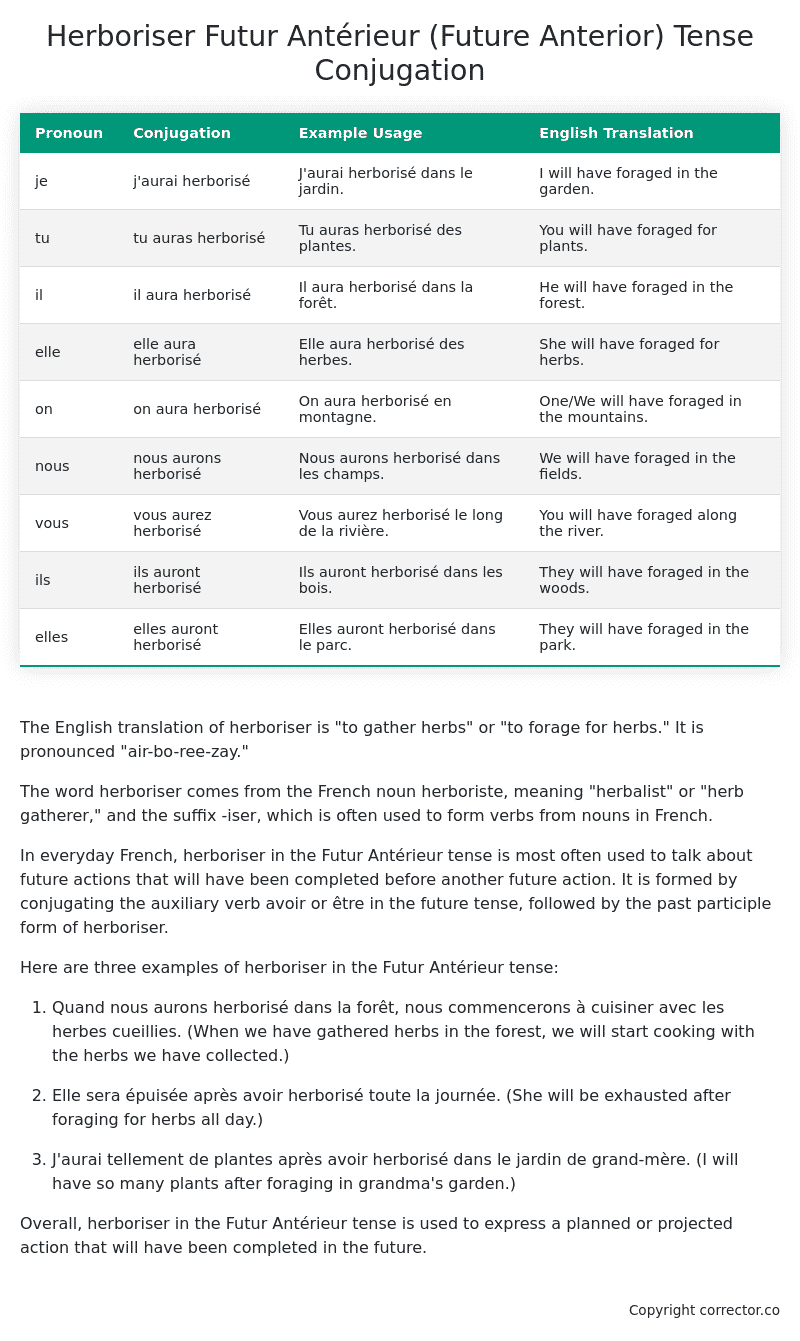Futur Antérieur (Future Anterior) Tense Conjugation of the French Verb herboriser
Introduction to the verb herboriser
The English translation of herboriser is “to gather herbs” or “to forage for herbs.” It is pronounced “air-bo-ree-zay.”
The word herboriser comes from the French noun herboriste, meaning “herbalist” or “herb gatherer,” and the suffix -iser, which is often used to form verbs from nouns in French.
In everyday French, herboriser in the Futur Antérieur tense is most often used to talk about future actions that will have been completed before another future action. It is formed by conjugating the auxiliary verb avoir or être in the future tense, followed by the past participle form of herboriser.
Here are three examples of herboriser in the Futur Antérieur tense:
-
Quand nous aurons herborisé dans la forêt, nous commencerons à cuisiner avec les herbes cueillies. (When we have gathered herbs in the forest, we will start cooking with the herbs we have collected.)
-
Elle sera épuisée après avoir herborisé toute la journée. (She will be exhausted after foraging for herbs all day.)
-
J’aurai tellement de plantes après avoir herborisé dans le jardin de grand-mère. (I will have so many plants after foraging in grandma’s garden.)
Overall, herboriser in the Futur Antérieur tense is used to express a planned or projected action that will have been completed in the future.
Table of the Futur Antérieur (Future Anterior) Tense Conjugation of herboriser
| Pronoun | Conjugation | Example Usage | English Translation |
|---|---|---|---|
| je | j’aurai herborisé | J’aurai herborisé dans le jardin. | I will have foraged in the garden. |
| tu | tu auras herborisé | Tu auras herborisé des plantes. | You will have foraged for plants. |
| il | il aura herborisé | Il aura herborisé dans la forêt. | He will have foraged in the forest. |
| elle | elle aura herborisé | Elle aura herborisé des herbes. | She will have foraged for herbs. |
| on | on aura herborisé | On aura herborisé en montagne. | One/We will have foraged in the mountains. |
| nous | nous aurons herborisé | Nous aurons herborisé dans les champs. | We will have foraged in the fields. |
| vous | vous aurez herborisé | Vous aurez herborisé le long de la rivière. | You will have foraged along the river. |
| ils | ils auront herborisé | Ils auront herborisé dans les bois. | They will have foraged in the woods. |
| elles | elles auront herborisé | Elles auront herborisé dans le parc. | They will have foraged in the park. |
Other Conjugations for Herboriser.
Le Present (Present Tense) Conjugation of the French Verb herboriser
Imparfait (Imperfect) Tense Conjugation of the French Verb herboriser
Passé Simple (Simple Past) Tense Conjugation of the French Verb herboriser
Passé Composé (Present Perfect) Tense Conjugation of the French Verb herboriser
Futur Simple (Simple Future) Tense Conjugation of the French Verb herboriser
Futur Proche (Near Future) Tense Conjugation of the French Verb herboriser
Plus-que-parfait (Pluperfect) Tense Conjugation of the French Verb herboriser
Passé Antérieur (Past Anterior) Tense Conjugation of the French Verb herboriser
Futur Antérieur (Future Anterior) Tense Conjugation of the French Verb herboriser (this article)
Subjonctif Présent (Subjunctive Present) Tense Conjugation of the French Verb herboriser
Subjonctif Passé (Subjunctive Past) Tense Conjugation of the French Verb herboriser
Subjonctif Imparfait (Subjunctive Imperfect) Tense Conjugation of the French Verb herboriser
Subjonctif Plus-que-parfait (Subjunctive Pluperfect) Tense Conjugation of the French Verb herboriser
Conditionnel Présent (Conditional Present) Tense Conjugation of the French Verb herboriser
Conditionnel Passé (Conditional Past) Tense Conjugation of the French Verb herboriser
L’impératif Présent (Imperative Present) Tense Conjugation of the French Verb herboriser
L’infinitif Présent (Infinitive Present) Tense Conjugation of the French Verb herboriser
Struggling with French verbs or the language in general? Why not use our free French Grammar Checker – no registration required!
Get a FREE Download Study Sheet of this Conjugation 🔥
Simply right click the image below, click “save image” and get your free reference for the herboriser Futur Antérieur tense conjugation!

Herboriser – About the French Futur Antérieur (Future Anterior) Tense
Construction
Common Everyday Usage Patterns
Interactions with Other Tenses
For example
Summary
I hope you enjoyed this article on the verb herboriser. Still in a learning mood? Check out another TOTALLY random French verb conjugation!


